In August 2017, Keith R.A. DeCandido took a weekly look at every live-action movie based on a superhero comic in the weekly 4-Color to 35-Millimeter: The Great Superhero Movie Rewatch. He caught up to real time, as it were, in January 2020, but is revisiting the feature every six months or so to look back at the new releases in the previous half-year. This week, we have The Old Guard, while next week, we’ll look at The New Mutants.
Greg Rucka got his start in the writing biz as a novelist in 1996, with the novel Keeper. Two years later, Oni Press published his comic book Whiteout, with art by Steve Lieber, and at the turn of the millennium, he became one of the major writers in DC’s stable, novelizing the “No Man’s Land” event in the Batman comics, followed by lengthy runs on various comics (including Gotham Central, a favorite of your humble rewatcher, in collaboration with Ed Brubaker and artist Michael Lark).
In 2017, he collaborated with artist Leandro Fernández on The Old Guard: Opening Fire, a miniseries published by Image. Three years later, Netflix released a film adaptation of the series.
It is rare, though not unheard of, for folks who worked on comics to later work on the movie adaptation of those comics. Frank Miller cowrote the first Sin City movie and wrote the sequel A Dame to Kill For solo, David Quinn co-wrote the movie version of Faust: Love of the Damned, Geoff Johns contributed to the stories of Aquaman and Wonder Woman 1984, and J. Michael Straczynski contributed to the story for 2011’s Thor, but they’re the exception. (Having said that, a lot of Batman comics writers contributed to Batman: The Animated Series—but comics writers have had an easier time breaking into animation scripting than live-action.)
Rucka, however, wrote the movie based on his comic book, and he’s the only one credited, so it’s a rare case of the writing credits on both source material and adaptation matching perfectly, which has only ever happened in this rewatch once before (A Dame to Kill For).
Mind you, the movie almost didn’t have this distinction, as Charlize Theron had issues with Rucka’s first draft and hired her own writers to redo it. However, Netflix wasn’t happy with that rewrite, and Rucka was brought back on to rewrite his script in a way that satisfied Theron.
Buy the Book
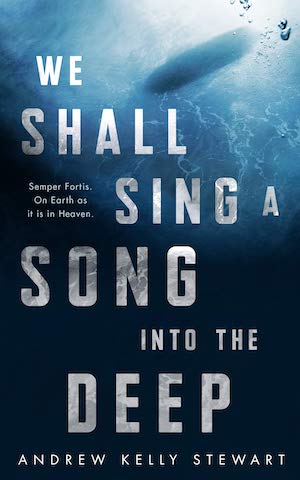

We Shall Sing a Song Into the Deep
Opening Fire, as well as its 2019 sequel Force Multiplied, are about immortals. For reasons that are never made clear—and that lack of clarity is sometimes a source of frustration to the characters—certain people are immortal. When a new immortal activates (when they’re killed for the first time), the other immortals dream of them until they find each other. Eventually, the immortality wears off, but there’s no warning or rhyme or reason to that, either.
The immortals are all warriors of some kind or other, and in modern times they take on jobs that (a) involve violence (at which they all excel) and (b) help people.
Theron plays the main character, Andromache of Scythia, who is thousands of years old, and goes by “Andy.” As the oldest of the immortals, she’s the leader. She’s joined by KiKi Layne as Nile Freeman, a U.S. Marine who becomes the latest immortal during the movie, Belgian actor Matthias Schoenaerts as Sebastien de Livre, who goes by “Booker,” Dutch-Tunisian actor Marwan Kenzari as Yusuf al-Kaysani, who goes by “Joe,” Italian actor Luca Marinelli as Nicolò di Genova, who goes by “Nicky,” and Van Veronica Ngo as Quynh, an immortal who is believed to have died. (The character in the comic was Japanese and named Noriko, but when the Vietnamese Ngo was cast, she asked that the name be changed to one that reflected her own heritage.) Rounding out the cast are Chiwetel Ejiofor (last seen in this rewatch in Doctor Strange) as Copley, Harry Melling (best known as Dudley Dursey in the Harry Potter films, and currently in The Queen’s Gambit as Beltik) as Merrick, and Anamaria Marinca as Dr. Kozak (gender flipped and renamed from Ivanov in the comic).
The movie was one of Netflix’s most-watched movies this year, and plans for a sequel are underway, likely an adaptation of Force Multiplied, set up by the final scene, which adapts a scene from that sequel miniseries.
“Sometimes you got to work with people you don’t want to eat with”
The Old Guard
Written by Greg Rucka
Directed by Gina Prince-Blythewood
Produced by David Ellison, Dana Goldberg, Don Granger, Charlize Theron, A.J. Dix, Beth Kono, Marc Evans
Original release date: July 10, 2020
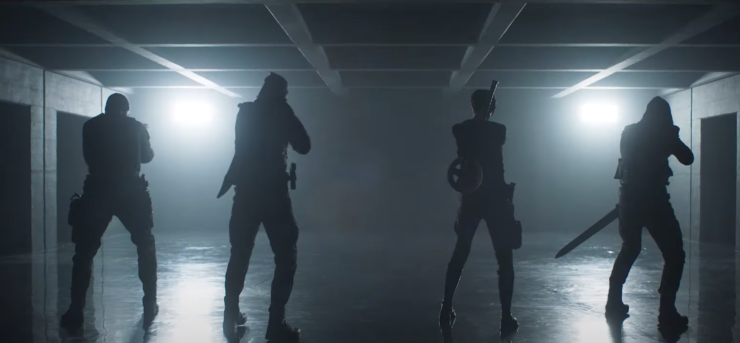
Four immortals, Andy, Nicky, Joe, and Booker, meet up in Marrakesh. It’s their first time together in a year, and they’ve been approached by a former employer, James Copley. Andy is reluctant, as they don’t like to repeat employers. If they stick with anyone for too long, they start to notice that they haven’t aged. But Booker says the job is worth it, and so Andy and Booker take the meeting, with Nicky nearby with a sniper rifle.
Copley isn’t working for the CIA anymore—he left when his wife died of ALS. He’s now running a freelance security company. He’s learned of children who’ve been kidnapped in the Sudan, and they need a quick rescue operation before the kids are separated and moved to where they can’t find them. Andy agrees, and they gear up for the mission.
Unfortunately, it’s a setup. There are no kids, just a big team of commandos who ambush them and shoot them to ribbons. Unfortunately for the commandos, they then get up and kill everyone.
In Afghanistan, Marines are chasing a terrorist. Sergeant Nile Freeman asks some women, through an interpreter, if they’ve seen him. Aloud, they say nothing, but one older woman, who says verbally that no man would hide behind women, also indicates a house with her eyes.
Freeman and another Marine enter the house, and subdue the terrorist, but he’s been wounded. Freeman tries to treat the wound—they’re supposed to bring him in alive—and the terrorist slices her neck open.
The quartet are livid at being set up by Copley and want to go after him. They burn their clothes and sneak onto a train. While sleeping, they dream about Freeman. For her part, Freeman wakes up in a base hospital, with not even a scar, and very confused, especially after dreaming about people she’s never met.
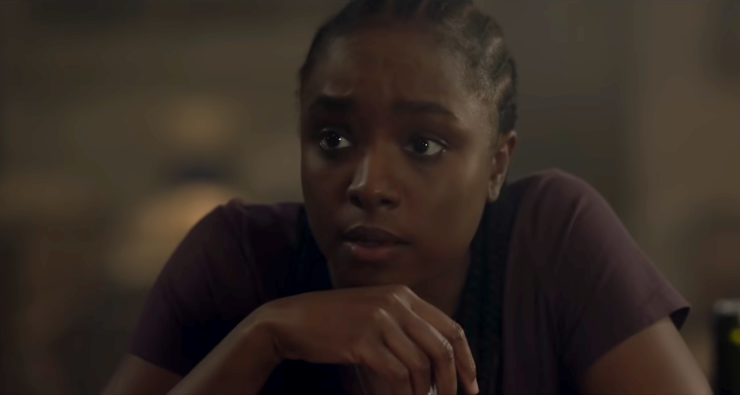
The quartet of immortals piece together their dreams and figure out that the latest immortal—and the first since Booker in 1812—is Freeman. Andy doesn’t want to divert from their task of finding Copley and making him pay, but letting Freeman wander around immortal and alone and unknowing could compromise them. So she goes to Afghanistan while the other three work to find Copley.
Andy is able to kidnap Freeman right before she’s to be flown to Germany for more tests. Freeman is confused at first, and unwilling to accept what’s happening, even after Andy shoots her in the head and she recovers. They hop a Russian drug runner’s plane, which Freeman tries to hijack by threatening the pilot. Andy says something in Russian and then shoots the pilot, and the plane starts to go down. A panicking Freeman frees Andy, at which point Andy says, “You don’t speak Russian, do you?” She reveals that what she said to the pilot was “Play dead.” The pilot “wakes up” and retakes control while Freeman and Andy fight. Eventually, Freeman calms down and goes along with what’s happening.
Freeman learns about the other immortals. There’s Andy, who’s been around so long she has no memory of how long she’s been alive, and can’t even remember her mother’s face. Booker was the youngest before Freeman, as he fought for Napoleon and “died” on the Russian front. Joe and Nicky were on opposite sides during the Crusades and kept killing each other over and over again; eventually they became lovers and have become inseparable in the millennium since.
Then there are the two who are no longer around. One is Lykon, who one day just stopped being immortal. His wounds stopped healing and he died. The other is Quynh, who rode and fought alongside Andy for centuries until they were captured by Puritans who condemned them as witches—and their inability to die just proved the accusation. They finally put Quynh into a suit of armor and threw her into the water, where she drowned over and over again.
Andy takes Freeman to an abandoned church outside Paris, to discover that Nicky, Joe, and Booker were ambushed. Nicky and Joe were taken, while Booker is left for almost-dead. They come back for Andy, but Andy takes them all out easily and bloodily, which both shocks and impresses the hell out of Freeman.
While Booker tries to figure out where to find Copley, Nicky and Joe are taken to Merrick Pharmaceuticals, run by Steven Merrick, a very young CEO who wants to figure out the secret of the immortals’ healing to mass produce it. The doctor he’s assigned to the task, Dr. Meta Kozak, takes a ton of samples from Nicky and Joe, but is unable to figure out what makes them immortal.
Freeman can’t handle the notion that she can never talk to her family again. This despite Booker telling her that his entire family disowned and hated him when he didn’t grow old and they all did. Andy decides to let her go and also charges her with ditching their car and the extra weapons. Andy also gives her the handgun Booker had handed her so she’s armed.
Booker and Andy arrive at Copley’s office, to discover that Copley figured out that they were immortal on his own—and did copious research to find all kinds of connections, including people they saved who later went on to do great things.
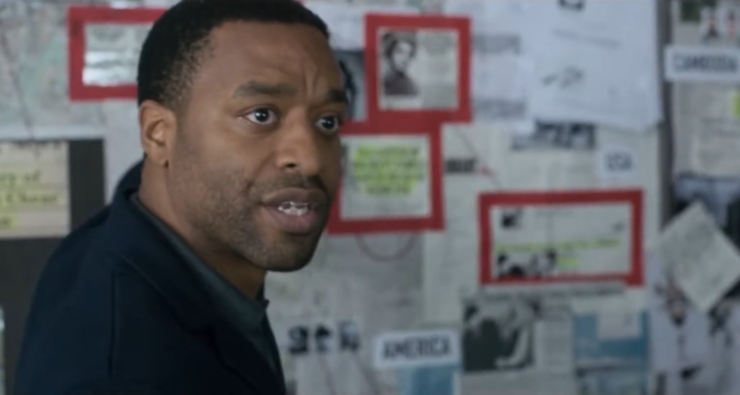
Copley betrayed the group to Merrick because he wants people to not suffer the way his wife did. And Booker helped him, as he proves when he shoots Andy. Booker just wants to finally be able to die. Unfortunately, Andy seems to have lost her immortality the way Lykon did, and she isn’t healing, to Booker’s devastation.
Merrick’s people take Booker and Andy away and render an objecting Copley unconscious. By the time Freeman shows up (having realized that the gun Booker gave to Andy, and which Andy gave to her, had no ammo in it, at which point Freeman has realized that Booker betrayed them), Copley’s all alone. Freeman shoots herself in the foot to prove she’s who she says she is, and Copley leads her to Merrick.
All four immortals are imprisoned by Merrick, Andy bandaged up, and all three of the others pissed at Booker. Freeman arrives and rescues everyone, though she loses Andy’s axe one of the times she’s shot “dead.” She frees the others, at which point, even with Andy no longer functionally invulnerable, they wipe out Merrick’s entire team of mercenaries.
Merrick, Andy’s axe in one hand, a gun in the other, threatens to shoot Andy if Freeman doesn’t give up. Andy asks if she thinks he speaks Russian, at which point Freeman pretends to shoot Andy herself. She plays dead long enough to distract Merrick.
Then Freeman jumps out a high-story window with Merrick, crashing into a car, killing Merrick, and it takes Freeman a bit to recover.
The five immortals gather at the Devil’s Tavern pub in London. Booker and Freeman sit outside while the other three decide on Booker’s punishment for betraying them. Freeman tells Booker that Copley arranged things so that Freeman will be declared killed in action. Andy then tells Booker that he has to stay away from them for a hundred years. They’ll meet back up at the pub after a century, and Joe, Nicky, and Freeman will decide his fate then. (Andy will be dead by then.)
After seeing how Copley managed to track down everything they did, the remaining immortals inform him that he’ll be responsible for finding jobs for them, and also covering their tracks so that someone else can’t do what Copley and Merrick did. Though they aren’t giving Copley a choice, the ex-CIA agent is, nonetheless, happy to do it.
Six months later in Paris, Booker stumbles home, drunk, to find a woman waiting in his apartment: it’s Quynh.
“She stabbed me, so I think she has potential”
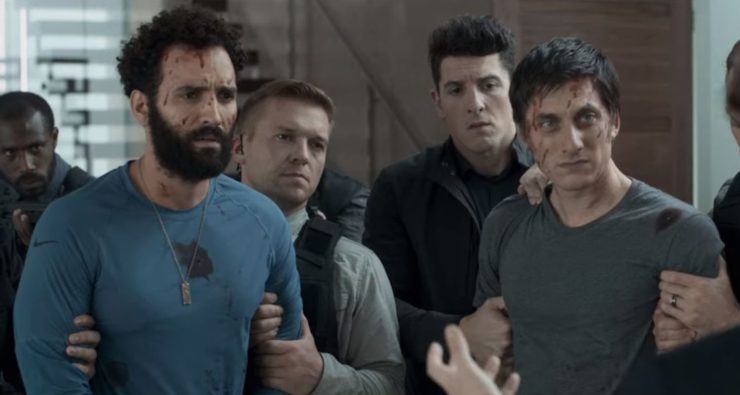
My favorite bit in this movie when I saw it the first time was when Nicky and Joe are captured. One of the mercenaries asks snottily if Nicky is Joe’s boyfriend, and Joe’s reply is: “You’re a child. An infant. Your mocking is thus infantile. He’s not my boyfriend. This man is more to me than you can dream. He’s the moon when I’m lost in darkness and warmth when I shiver in cold. And his kiss still thrills me, even after a millennia. His heart overflows with the kindness of which this world is not worth of. I love this man beyond measure and reason. He’s not my boyfriend. He’s all and he’s more.”
A longer version of this speech is in the comic book, and it turns out that it was stipulated in Greg Rucka’s contract that any filmed version of this story had to include that sequence.
Which is awesome, and is one of the reasons why I adore this movie (and the comic it adapts) so much. Our five immortals aren’t just characters in a story, they’re people. And they all do such a good job of showing the weight of their years, especially Charlize Theron, whose Andy is just so exhausted. She’s just so obviously done with everything. Matthias Schoenaerts’ Booker has a similar affect, as his continental ennui is cranked up to eleven.
Director Gina Prince-Blythewood deserves a ton of credit here, as the movie manages that perfect balance between strong character work and powerful action sequences that superhero movies rely on if they want to be any good. The fight choreography is also stellar. The four immortals fight like a well-oiled machine, and Freeman—a combat Marine—mixes in well with them. I particularly like how easy they all make it?, and I particularly like how the immortals all fight with more aggression than their opponents, simply because they know they can’t be hurt permanently. (I also like that the filmmakers are aware that guns don’t have an infinite supply of ammunition and need to be regularly reloaded.)
The exception is Theron’s Andy, but not just because she becomes mortal partway through the movie—rather it’s because she’s really so much better than anyone else. It’s so effortless for her, she almost seems bored. I used to do karate with a high-ranking black belt—he’s since left our dojo to open his own dojo in a different discipline—and he is an amazing fighter. What blew me away watching him in sparring tournaments is that he barely moved and just made everything look so easy and effortless as he knocked people repeatedly to the ground and kicked them repeatedly in the head. Theron has that same style about her in her fight scenes.
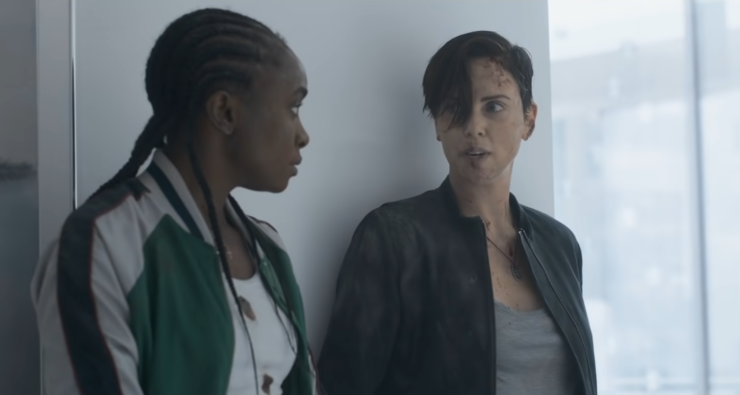
It’s fascinating to look at the changes made from the source material, especially because both had the same writer. Some changes are for the better: the movie adds that Copley’s wife died of ALS, a particularly brutal, debilitating disease, thus providing him with a more solid and more noble motive for betraying the team to Merrick. Others are not improvements: Freeman is a woman of many talents in the comic, but that’s toned down in the movie, going so far as to not make her fluent in Pashto as she was in the comic, instead relying on a translator. And others are neutral: in the comic, Andy is a drunk, smokes a ton, has a metric buttload of casual sex, and struggles with modern technology, where Theron’s Andy does none of those things.
The biggest change, though, is that Andy has become mortal, which did not happen in the comics. It certainly raises the stakes of the climactic fight, as Andy, unlike the others, can be hurt. I’m wondering if this was a trap door for Theron in case she didn’t want to keep playing the role once she got into her 50s (she turned 45 this year).
The only place where the casting falls down is in the villain, though there isn’t a lot to work with here. The Merrick of the comic is a one-dimensional cartoon psycho, a fourth-rate version of Jared Leto’s Joker from the Suicide Squad movie. As played by Harry Melling, the movie iteration is, instead, a fourth-rate version of Tom Hiddleston’s Loki, which isn’t as much of an improvement as it needs to be. This is a role that calls for the bureaucratic blandness of David Strathairn in The Bourne Ultimatum, and as played by Melling you just can’t take him seriously as a bad guy.
Chiwetel Ejiofor makes up for this, though, giving Copley a depth of character he didn’t even have in the comic. You feel his pain in betraying them, but also his fervent desire to try to find a way for people not to suffer. And Theron, Schoenaerts, Marwan Kenzari, Luca Marinelli, and especially KiKi Layne are superb.
This is a great adaptation of a great comic book, and I very much look forward to seeing how they handle Quynh’s return in the sequel adaptation of Force Multiplied. (I also hope that the movie has a better title…)
Next week, we’ll take a gander at the only superhero comic book adaptation to be released in theatres after the COVID-19 pandemic struck the U.S. to date: The New Mutants.
Keith R.A. DeCandido also is doing a rewatch of Star Trek: Voyager every Monday and Thursday for this site, plus reviews of each new episode of Star Trek: Discovery when it is released on Thursday.










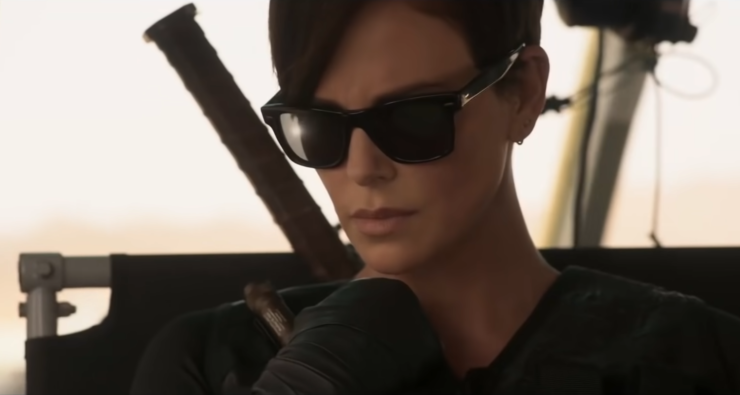
“Eventually, the immortality wears off…” — My first thought was to quibble that it isn’t immortality, then, but then I figured out you were using it in the sense that they can’t be killed, as with Highlander or Captain Jack Harkness.
“(The character in the comic was Japanese and named Noriko, but when the Vietnamese Ngo was cast, she asked that the name be changed to one that reflected her own heritage.)”
I wonder why there aren’t more Japanese actors in US film and TV. It seems more common to see actors of other Asian ethnicities cast as Japanese characters (e.g. Rosalind Chao as Keiko O’Brien, Linda Park as Hoshi Sato, or John Cho as Sulu and Spike Spiegel) than the reverse, or than Japanese actors playing Japanese characters (though that has been known to happen, as with both screen versions of DC’s Katana, Rila Fukushima and Karen Fukuhara).
I adored this movie to teeny tiny pieces, it ticked all the boxes for me. I haven’t yet read the comics which clearly I need to do. I do have one quibble though – what happens if they’re beheaded? I understand why it isn’t mentioned – no-one wants to deal with Highlander comparisons – but that would seem to be a method of death they couldn’t come back from.
Delighted to hear there will be a sequel and I can’t wait to watch it.
I wish Nile had been anything other than a soldier, it has become such a lazy cliche to have a character have a military background these days. It is backstory subbing for character, and it is done to death. Are screenwriters so bereft of imagination that they cannot come up with anything different for protagonist characterisation?
It would have been so much more interesting to have, I dunno, a teacher or a delivery driver, or an online metalworkers, become this new addition to the world of immortal Deadpoolery without the quippitude, and have a real clash of character and real development. Also, I’m not sold on the idea that making a clean break with your family because of immortality is a good idea. I would give anything for even an extra hour again with my grandmother, rest her soul, that I cannot conceive of someone who’d walk away from a good family relationship because it would make things difficult. Even Deadpool has better family sense than Nile there.
kayom: Nile did try to go back to her family, but went back when she realized Booker had betrayed them.
And all of the immortals were warriors of some sort. Whatever it is that determines who gets to be immortal, that seems to be a part of it, since all seven immortals we know about have been warriors.
Also Nile isn’t a soldier, she’s a Marine. This may not matter to you, but trust me, it matters a lot to a Marine. (And, for that matter, to a soldier.)
—Keith R.A. DeCandido
Whether they are in the army-army or in the navy’s army, they are all soldiers. Stick a uniform on someone, give ’em a gun, and tell them to go to another person’s country, and that makes them a soldier.
As always, we ask that you keep the tone of conversation civil and constructive and avoid making disagreements personal. Our moderation policy can be found here.
Probably there are fewer Japanese actors available for casting in American media productions because there are fewer Japanese heritage people in America, and the number isn’t growing. There are more and increasing Chinese, Korean, and Vietnamese people, and that’s good enough for casting directors.
It’s not like they make an effort to cast heritage-appropriate actors as e.g. Irish or Scottish characters either, to take one example. A recent film set and filmed in Ireland has one Northern Irish cast member, playing opposite an English and an American actor. English, American, Canadian, South African, Irish, Scottish, New Zealand and Australian, as well as Danish and German, actors are considered interchangeable in English-language productions, to play anyone from Scottish to Egyptian characters (see Highlander, starring a French “MacLeod” and a Scottish “Ramirez” (Sean “I’m Egypshian” Connery).
In British films, there are an increasing number of recent African origin actors, who are typically cast as British Caribbean or black American characters. Idris Elba, Chiwetel Ejiofor, Daniel Kaluuya and John Boyega come to mind.
@10/Del: If you say so. It’s just that I watch so much Japanese TV and movies, so it’s weird for me to see so few Japanese actors in productions from this side of the pond. There are some really good actors that I’d like to see cross over, though most of them probably aren’t fluent in English.
Someone on Twitter wondered why after living for centuries, they hadn’t found anything to do other than being soldiers of fortune. I guess it’s just “stick to what you know”.
Let me see if I understand this: Our hero’s are a bunch of mercenaries who enjoy their job of killing people who cannot kill them back, the antagonist is a man so psychotically depraved he wants to invent a cure for death, and the only characters in any apparent danger in the action scenes are the anonymous henchmen of the antagonist.
Is that it?
ad: Not quite. Our heroes are a bunch of mercenaries who take on jobs that save innocent lives, and the antagonist is a sociopath who thinks it’s okay to maim and murder for the greater good, and who also thinks that ambushes are a better alternative to, y’know, asking for help.
—Keith R.A. DeCandido
I recently watched this movie for the second time and enjoyed it much more than the first –always a good sign. My only beef is that being soldiers of fortune forever sounds like the crummiest possible way of spending one’s immortality.
That said, I love everything about this movie. The cast is plain wonderful –just to mention two of them, I could watch Charlize Theron cut vegetables for hours, and Chiwetel Ejiofor does conflicted, secret sufferers like no one else (while looking insanely hot in the process, one might add). And the charismatic Kiki Layne is a welcome new face.
The Speech brought tears to my eyes both times. At this point in time, one is so used to the casual homophobia of action flicks, and suddenly THIS happens. And leaves you breathless. The fact that the couple proceeds to beat the living daylights out of their captors is a nice bonus.
I impatiently await the next installment.
@@@@@ 13: Only in the sense that Shakespeare’s Hamlet is basically the story is a guy who makes a mess of avenging his father.
Sorry if I’m posting a duplicate, but can’t see my old comment: watch for an unrecognizable Dursley Dudley, who also appears in Netflix’s The Devil All the Time.
I find the weakness of the villain is not so much his fault as the script’s. He’s not as fully rounded a character as most of the others, and gets very little screen time.
@18, Melling is also in The Queen’s Gambit!
They’ve been soldiers of fortune for centuries because there wouldn’t be a movie if they were doctors or something. Come to think of it, I think there was a TV show about an immortal doctor…
Finally watched this, and I think Old Guard is one of those movie adaptations that is better than the source material. I wonder sometimes if there are two kinds of writers that adapt their own, print work for the screen. The ones that want to stick too closely to elements that work better on the page, and the ones that take this as an opportunity to fix the “bugs” in the original (especially comics which are often written on a tight schedule).
There can be only one. I kind of miss the Game.
1) Sulu is a special case. “Sulu” is not a plausible Japanese name, and I understand the character was originally conceived as more generically east Asian. When did canon declare Sulu to be Japanese, or Japanese-American?
@24/David Shallcross: “When did canon declare Sulu to be Japanese, or Japanese-American?”
I’d say it was when ST VI canonically established his given name as Hikaru. Though the bit in “Shore Leave” where he dreams up a samurai is suggestive.
As for his surname, this is interesting:
https://memory-alpha.fandom.com/wiki/Hikaru_Sulu#Name_origins
Tsuru is indeed a valid Japanese surname; for instance, Hiromi Tsuru was a voice actress famous for playing Bulma in the Dragon Ball franchise. (Interestingly, Jeri Taylor gave Hikaru Sulu a grandson named Hiromi Sulu in Voyager: Pathways. Coincidence or homage?) The “ru” syllable can be just as validly romanized as “lu,” and I can see “Tsu” being romanized as “Su” (although going the other way, it’s often used in Japanese as the phonetic pronunciation of the English number “two”).
Correction: The Japanese phonetic rendering of “two” is tsuu (two syllables), not tsu (one syllable). I got a little mixed up there.